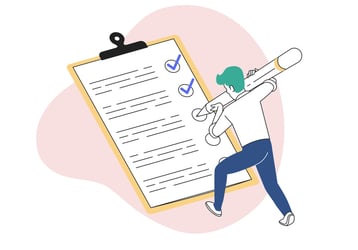How I focus on writing
To be a great writer, you have to be able to concentrate. It’s not the only thing you’ll need, but it’s certainly a good start!
It sounds simple enough, but a lot of us (myself included) often struggle to stay on-task.
I’m writing this post to share some of the habits and techniques that have (sometimes) helped me to improve my own concentration. And yes, I know that some of them are contradictory. That’s the ‘sometimes’.
In any case, I hope you find the following 22 tips useful, especially if you're gearing up for a big writing push, like for the annual NaNoWriMo (or the poetry equivalent). That's a whole lot of concentrating!
Without further ado, here are my secrets to staying focused:
1. Get in the flow
Psychologists describe a powerful form of concentration called 'flow'. It happens when someone concentrates and is fully engaged with what they are doing. (See the Wikipedia definition.) When you’re writing like this, writing fluently comes naturally.
We all recognise this state. “Time flies when you’re having fun” is one version. Meditation is, perhaps, another version. If you play sports or video games and you find yourself ‘at one’ with what you’re doing, that’s another. All these mental states require concentration.
2. Multitasking doesn't work
Conversely, failure to concentrate can be very unproductive. In fact, multitasking makes us stupid. People who think they are good at multitasking aren’t, according to researchers at Stanford University. That’s you and me, dear reader.
3. Accept your distractions
You will get distracted. Your mind will wander. You won’t want to get started. Accept it. The trick is to stand back and notice your brain doing these things. When it happens, stand back from yourself. Notice the distraction. Name the monster. Gently remind yourself that you’re trying to concentrate, and it will be easier to return your focus to your work.
4. Use a concentration timer
I like using meditation timers when I write. A little bell every five minutes helps remind me to put my focus back onto my writing if my mind has wandered.
5. Go somewhere else
Do you write a bit more neatly when you get a new pen? Change can be beneficial, even if the effect is temporary. Sometimes a change of location (go to the park, Starbucks, the Kitchen – anywhere but here) or a change of method (use a quill, a pencil, a typewriter, a different word processor, Linux, smoke signals) can help.
6. Stay where you are
I’m always getting up and going somewhere to get something or do something. To counter this tendency, I keep scrap paper (recycled A4 printer paper cut in half) by my desk and scribble reminders. Then back to the writing.
7. Write at a different time
I write best if I get up early. (See ‘How I trained myself to get up earlier in the morning’ for more on that.) Just changing your routine can be helpful, so try waking up a little earlier. It also feels more virtuous than staying up late with work.
8. Write to a schedule
When I have a busy week laden with deadlines, I block out time for my work in Microsoft Outlook. This helps me allocate time and measure progress on longer-term projects and ensure that I have enough time to do all the work I planned. Other people find it helpful to determine their most productive writing-time and stick to it.
9. Morning pages
I have to admit that I haven’t tried Julia Cameron’s technique for unblocking your creativity, but other people – including my wife – swear by it. It involves writing in a stream of consciousness first thing every day.
10. Switch off distractions
Turn off your radio, TV, shut the door, close your email program, put your phone on mute, close unnecessary tabs (stop working on your own blog!) and use a distraction-free word processor. Full-screen your writing software. The more you can do to stop distractions before they happen and allow you to focus on writing, the better.
11. Tame your muse
Your muse works for you, not the other way around. Think of it as a recalcitrant employee. Give it deadlines, tell it to show up for work at a fixed time every day, give it feedback and praise, and define what you expect from it.
12. Seek inspiration
Lots of people praise walking or running as a source of inspiration. The best advice I ever had was from my history tutor at Oxford – keep a notebook with you at all times, because you never know when you will have a good idea.
13. Quantify
Use word count to set goals – 500 words and then a break, for example. Track writing output over time in a spreadsheet. Use a platform like Joe’s Goals to keep track of habits in the long term. Some people, like me, are highly motivated by a sense of progress.
14. Silence
External noise can break your concentration. Try noise cancelling headphones (I use Bose), music (see ‘Music for working’), silent PC (see ‘Tools for writing: Silent PCs’) or ear plugs.
15. Meditate to develop concentration and calmness
I find it helpful to meditate a little before I start work. It’s not easy for me, but when I do it I find it really helps. I sit cross-legged in a quiet room and count my breaths. The Headspace app or Calm may be a helpful place to start. (See our post on apps for mental wellbeing for more)
16. Treats
I like tea (See ‘Tools for writing: A nice cup of tea’). Other people prefer cigarettes, Jaffa cakes - whatever. I would just be wary of too many sugary treats, because they could cause a sugar crash later on – you end up borrowing energy from yourself. Try healthier snacks like fruit or nuts to keep your energy levels steady throughout the day.
17. Punishment
Try Write or Die if you really want to light a fire under yourself. If you don’t keep writing, it starts deleting what you have already written! This is brilliant for writing to deadlines, but potentially painful.
18. Shame and greed
Instead of running a 26-mile marathon, aim to write 26,000 words and get your friends to sponsor you for charity. If you fail to do it, you won’t raise any money and you’ll feel bad. Nothing like social pressure to keep you at the keyboard. Alternatively (and if it applies to you) remind yourself that you’re getting paid for what you write, might not get paid again if it’s late.
19. Buddy writing
Working with a friend, even over an open Skype line, can encourage concentration, providing you both have the same work habits. Somehow the peer pressure keeps you both working hard. It’s also an antidote to the potential loneliness of the long-distance writer.
20. Chunking
Write for 45 minutes, take a 15-minute break. Repeat. That's how you go from nothing to starting a blog AND finishing it. The Pomodoro Timer is a good place to start for this approach to productivity.
21. Don’t worry
Editing is not writing. Don’t let your mental self-editor get in the way of the super-productive copywriter in you. Learning how to write well is accepting that your first draft might not be perfect. Leave notes to yourself in your text – fact-check, tidy up, rewrite, condense. The important thing is to keep writing now and edit later.
22. Use TK
This is a special case of ‘Don’t worry.’ If there’s something you don’t know, don’t stop to look it up. Just put TK in the text. It means ‘to come [later]’. For example, ‘When Neil Armstrong landed on the moon in TK DATE, he didn’t expect to meet little green men.’ Fill in the blanks later. TK is easy to search for because it doesn’t occur often in everyday writing. (There are a few exceptions, such as the band Outkast.)
Bonus: Rock and river
Water is soft and rocks are hard, but a river can defeat a rock with patience and constant effort over time. I think it’s the same with writing. A little every day beats a lot once a year. If you keep this in mind, concentrating for a short period every day becomes easier.
Leave a hook to get you started
When you finish writing each day, try to leave a few notes in your text to help you get started the next day. This will make it easier to overcome inertia and re-engage with the work.
I hope you've enjoyed these tips, and that they help you on your way to writing stardom. Don’t forget us when you’re a famous author.
Like anything, concentration comes down to preparation. If you can set yourself up to enter a concentrated mindset, you'll be able to concentrate. As the Scouts say, 'always be prepared'.
[Originally published in 2009, this has been updated in 2020]




